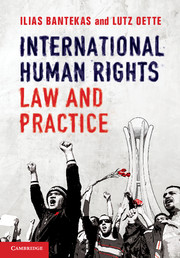Book contents
- Frontmatter
- Contents
- List of abbreviations
- Table of Cases
- Introduction
- 1 International human rights law and notions of human rights: foundations, achievements and challenges
- 2 International human rights law: the normative framework
- 3 Human rights in practice
- 4 The United Nations Charter system
- 5 The UN human rights treaty system
- 6 Regional human rights treaty systems
- 7 Individual complaints procedures
- 8 Civil and political rights
- 9 Economic, social and cultural rights
- 10 Group rights: self-determination, minorities and indigenous peoples
- 11 The human rights of women
- 12 The right to development, poverty and related rights
- 13 Victims’ rights and reparation
- 14 The application of human rights in armed conflict and the international criminalisation process
- 15 Human rights and counter-terrorism
- 16 Non-state actors and human rights
- 17 Globalisation and its impact on human rights
- Index
- References
8 - Civil and political rights
- Frontmatter
- Contents
- List of abbreviations
- Table of Cases
- Introduction
- 1 International human rights law and notions of human rights: foundations, achievements and challenges
- 2 International human rights law: the normative framework
- 3 Human rights in practice
- 4 The United Nations Charter system
- 5 The UN human rights treaty system
- 6 Regional human rights treaty systems
- 7 Individual complaints procedures
- 8 Civil and political rights
- 9 Economic, social and cultural rights
- 10 Group rights: self-determination, minorities and indigenous peoples
- 11 The human rights of women
- 12 The right to development, poverty and related rights
- 13 Victims’ rights and reparation
- 14 The application of human rights in armed conflict and the international criminalisation process
- 15 Human rights and counter-terrorism
- 16 Non-state actors and human rights
- 17 Globalisation and its impact on human rights
- Index
- References
Summary
Introduction
Civil and political rights emerged out of fundamental rights conceptions protecting life, integrity and liberty of a person against an overbearing state. The twentieth century demonstrated that these rights were at risk in multiple contexts, ranging from genocidal campaigns, dictatorships and arbitrary law enforcement to conflict and a breakdown of law and order. Rights such as freedom from ill treatment may also be at risk from other sources, namely non-state actors in the domestic and other spheres, which have taken on a growing importance in the wake of states’ withdrawal from public functions. While international human rights standards have been developed to provide adequate protection in these circumstances, their implementation requires certain structures without which it is unlikely that core civil and political rights can be effectively protected. The rule of law (although a rather ambiguous term), the administration of justice and democratic structures are key components in this regard. While international human rights law does not mandate that a particular political system be in place, it is difficult to see how rights can be effectively protected without having at least a minimum of checks and balances.
Equally, however, a democratic system as such is not a panacea for rights protection. Indeed, there are deep-seated structural factors that can, and have, undermined the effective protection of rights in all systems. Social exclusion, inequality and discrimination in particular are prone to significantly increase vulnerability, as evident in the higher likelihood of persons from certain ethnic or class or national backgrounds being subject to arbitrary arrest, detention, ill treatment and other violations. As a yardstick of power relations in a society, social exclusion, inequality and discrimination are also closely related to lack of access to justice, which both reflects and compounds vulnerabilities and impunity. The lack of effective remedies and accountability of those responsible has been identified as a central factor contributing to the perpetuation of violations. The resulting impunity constitutes both a cause and manifestation of a malfunctioning system that fails to protect. Against that background this chapter identifies the normative content of the right to life, the prohibition of torture, the right to liberty and security, the right to a fair trial and qualified rights, particularly freedom of expression, and examines the challenge of ensuring their effective protection. It also considers the issue of enforced disappearance, one of the most serious violations that has spawned a rich jurisprudence but has only recently become the explicit object of an international treaty.
- Type
- Chapter
- Information
- International Human Rights Law and Practice , pp. 313 - 365Publisher: Cambridge University PressPrint publication year: 2013

